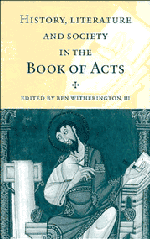Book contents
- Frontmatter
- Contents
- Preface
- PART I ISSUES OF GENRE AND HISTORICAL METHOD
- 1 In the shadow of Thucydides
- 2 How history should be written
- 3 The Acts of the Apostles: monograph or bios?
- 4 The preface to Acts and the historians
- 5 The future of the past: Luke's vision of salvation history and its bearing on his writing of history
- PART II HISTORICAL AND THEOLOGICAL DIFFICULTIES IN ACTS
- PART III ISSUES OF LITERARY CRITICISM
- Index of biblical references
4 - The preface to Acts and the historians
Published online by Cambridge University Press: 02 February 2010
- Frontmatter
- Contents
- Preface
- PART I ISSUES OF GENRE AND HISTORICAL METHOD
- 1 In the shadow of Thucydides
- 2 How history should be written
- 3 The Acts of the Apostles: monograph or bios?
- 4 The preface to Acts and the historians
- 5 The future of the past: Luke's vision of salvation history and its bearing on his writing of history
- PART II HISTORICAL AND THEOLOGICAL DIFFICULTIES IN ACTS
- PART III ISSUES OF LITERARY CRITICISM
- Index of biblical references
Summary
The beginning of a text has a special place in the orientation process which forms an inevitable part of any reader's approach to a new book. In the ancient world, where a book had neither dust-jacket nor publisher's blurb, the opening of a book, whether or not it constituted a formal preface, was particularly important. It was frequently used to identify the subject of the text which followed, sometimes the author or a particular readership. It could also be used, less directly, to identify the genre of the text: in a literary world which operated with a relatively formal code (formal, that is, by twentieth-century standards), the conventions employed at the beginning of the text could alert the reader as to what kind of text to expect.
The commentators on Acts have long been aware of the potential literary significance of its opening words. Cadbury, writing in 1922, stated clearly what was to become a datum of Lucan scholarship: “[Luke's] prefaces and dedications at once suggest classification with the contemporary Hellenistic historians.” The influential commentaries of Conzelmann and Haenchen contain classic restatements of this position:
Acts, as the second book of a large historical work, begins in accordance with literary forms with a renewed dedication (to Theophilus) and a backward glance to the first book … This opening verse shows that firstly: Christianity is adopting the literary forms. It is therefore on the point of leaving the milieu of ordinary folk and entering the world of literature, the cultural world of antiquity.
- Type
- Chapter
- Information
- History, Literature, and Society in the Book of Acts , pp. 73 - 103Publisher: Cambridge University PressPrint publication year: 1996
- 3
- Cited by



